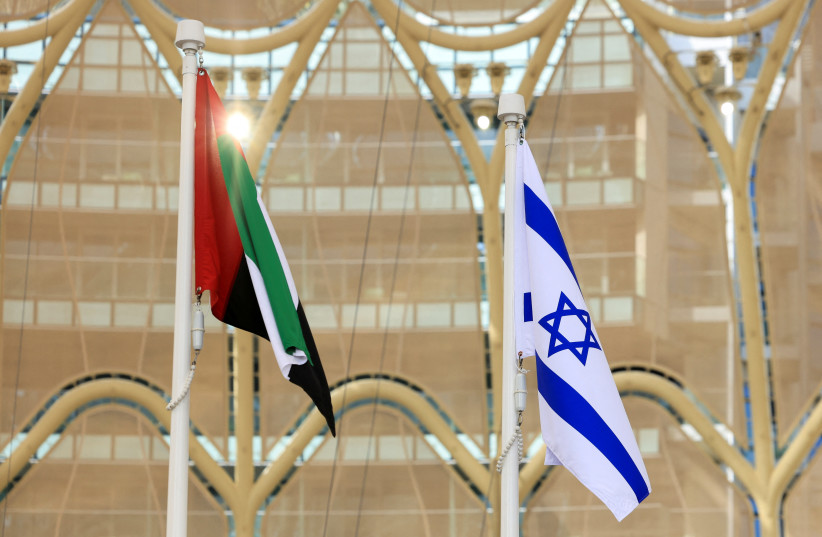A beautiful idea. An international music concert in the United Arab Emirates promoting brotherhood and tolerance. I’m part of the team that developed the idea two years ago. We had tentative plans of staging the concert this year, bringing together world-famous musicians in Dubai to promote peace and reconciliation in the Middle East. We had grandiose ideas of supporting the Abraham Accords and true friendship between peoples and nations.
For more stories from The Media Line go to themedialine.org
The Dubai International Peace Concert team comprises legendary Israeli musician David Broza, Palestinian peacemaker and reconciliation scholar Dr. Iyad Aldajani, and me, Jack Baxter, a filmmaker and freelance journalist from New York City. We figured an Israeli, a Palestinian, and an American could pull the event together. But instead of glorious music, we are now witnessing a vicious war with horrendous casualties.
I first met David Broza 20 years ago when I got blown up in a suicide bombing while making a documentary about Mike’s Place, a live music bar next to the US Embassy on the Tel Aviv beachfront. Remembering that horrible event, Broza told me after midnight on April 30, 2003, the blast, only a couple blocks away from his apartment, rocked him out of his bed. He grabbed a stack of army blankets and water and headed downstairs for Mike’s Place. First responders inside the yellow caution tape recognized him and thanked him for bringing supplies. I was lying on a stretcher, unconscious.
In 2017, Dr. Iyad Aldajani and I first met in Jerusalem at The Media Line town hall event for my documentary The Last Sermon. Iyad was born into one of Jerusalem’s most prominent and historic Arab families, the Dajanis. In 2014, Aldajani helped his uncle Mohammed Dajani, a professor at Al Quds University, organize and lead a group of 27 Palestinian students on a visit to the Auschwitz-Birkenau State Museum in Poland as a teaching lesson that “suffering has helped shape the historical consciousness of the other side.”
Receiving backlash
The controversy and backlash he and his uncle faced when they got home was Iyad Aldajani’s baptism of fire as a Palestinian peacemaker and reconciliation scholar.

In February 2020, Aldajani and I spent a week together in Tunisia, where in 2011, the Arab Spring had started. We premiered The Last Sermon at the 6th Human Rights Film Festival in Tunis. The film won the Prix de l’Espoir (Prize of Hope).
When the Abraham Accords were signed in 2020, Aldajani and I believed this unprecedented deal between Arab countries and Israel had changed the Middle East. We thought the timing was right for something new. Something bold. We created a concert event in Dubai featuring Israeli, Palestinian, Arab, European, and American musicians. Iyad’s family and friends in the UAE arranged meetings in Dubai and Abu Dhabi with a think tank and educators who could help make our peace concert happen.
It was now or never for the three of us to put our peace concert together in May 2022.
In New York, David Broza and I met for coffee in the lobby of the Roxy Hotel in Tribeca. “Yes, of course I’m in,” he said. We wanted Broza headlining, assured his friends would sign on for the show.
In the UAE, Iyad and I met serious individuals who supported our vision with agreements-in-fact on terms and financing: The UAE takes care of everything required from their end. Everything. The sole requirement on our end: We do what it takes to get the acts and deliver the show.
Halfway into my 13-hour return flight to the States, I realized I didn’t have the money to accomplish my end of the deal or the wherewithal to go any further. I put the deal on hold. Maybe we can revive it after the Hamas War ends.
I’m a victim and survivor of a suicide bombing on the same day the 2003 UN Quartet Roadmap for Peace Plan was presented to the Palestinians and Israelis in an effort to solve the Middle East Conflict. My personal experience is that Hamas doesn’t want the two-state solution. They want the final solution. Hamas are not freedom fighters. They are a violent, militaristic religious cult government, using savagery to create their own victorious interpretation of Armageddon.
Hamas hates music. In 2003, they hit Mike’s Place, located next to the American Embassy, on a Tuesday Jam Nite. Israelis, Arabs, Europeans, Americans, and US Marines in their civvies were having a good time listening and dancing to the music when it was attacked.
But October 7 is what’s happening now. And not my 20 years of memories.
When time comes for our peace concert, no unrepentant terrorist murderers and kidnappers are invited. Hamas hates peace and music anyway. And they won’t be missed.
Jack Baxter is a writer, director, producer and freelance journalist from New York City. He directed and produced the 1995 documentary Brother Minister: The Assassination of Malcolm X. He and his wife Fran Strauss-Baxter are the producers of the documentary, Blues by The Beach (2004). He is the co-author of the graphic novel, Mike's Place: A True Story of Love, Blues, and Terror in Tel Aviv (2015). His documentary The Last Sermon (2020) was awarded the Prix de l'Espoir at the 6th International Human Rights Film Festival in Tunis, Tunisia.
